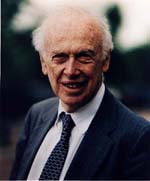DNA pioneer to begin yearlong focus on science, technology
 James D. Watson, the Nobel Prize-winning scientist who discovered the structure of DNA, will kick off Wake Forest University’s “Science and Technology: The Next Millennium” theme year on Sept. 16.
James D. Watson, the Nobel Prize-winning scientist who discovered the structure of DNA, will kick off Wake Forest University’s “Science and Technology: The Next Millennium” theme year on Sept. 16.
Watson will speak at the university’s Opening Convocation at 11 a.m. in Wait Chapel. The public is invited to the free event.
Regarded as one of the greatest scientists of the 20th century, Watson discovered that DNA has the shape of a double helix, a twisting ladder of nucleotides that “unzips” during cell division. For that research, Watson and fellow researchers Francis Crick and Maurice Wilkins were awarded a Nobel Prize in 1962. More recently, Watson has been a central figure in the Human Genome Project, an international project that aims to crack the human genetic code and open up the possibility of gene-based therapies for diseases and conditions ranging from breast cancer to depression.
During its yearlong celebration of science and technology, Wake Forest will offer a series of speakers, events and activities focusing on science and technology topics including cloning, computer security issues and the state of the environment.
“The change of the new millennium seemed like the perfect time to discuss the achievements of science and technology and to look toward the future and what it might hold,” said William E. Conner, a professor of biology at Wake Forest and chair of the theme year’s planning committee. The majority of the events are free and open to the public.
In the fall, the university will continue to examine current genetic research and its implications in a series of events on “Cloning and the Human Genome Project.” Events include a lecture by Norman J. Dovichi, a professor with the University of Alberta and the Northern Lights Laser Lab. Dovichi will discuss capillary electrophoresis, which is used to analyze DNA. Also planned is a joint symposium with Wake Forest School of Law and School of Medicine on the legal ramifications of gene technology.
A weekend film series in October will explore the intersection of technology and the human body, as well as misrepresentation of science in film. Films include “Gattaca,” “Blade Runner,” “Alien Resurrection” and “RoboCop.” Faculty and student discussions are planned in conjunction with the films.
A special art exhibit, “Fusion: Art & Science,” will run from October through December in the Wake Forest Fine Arts Gallery. The exhibit will feature seven artists, such as M.C. Escher, who use scientific principles in the creation of their work.
In January, several events are planned to address “Living in a Networked World: Community, Security and Privacy.” Events include a lecture by S. Brent Morris, senior mathematician at the National Security Agency, who will discuss “Classic Encryption.” Also scheduled is George Dyson, author of the book, “Darwin Among the Machines.”
In late January, noted astrophysicist Michael S. Turner, a distinguished service professor at the University of Chicago, will give a public lecture on cosmology, the study of the universe’s form and evolution.
Award-winning scientist and environmentalist David Suzuki will give Wake Forest’s Founders’ Day Convocation address on Feb. 10. Suzuki hosts the Canadian Broadcasting Corporation’s television program, “The Nature of Things,” and PBS’s “The Secret of Life.”
A professor in the Sustainable Development Research Institute at the University of British Columbia, Suzuki is known for exploring the relationship between science and society and explaining the complexities of the natural sciences in a compelling and easily understood way. He is the author of 28 books, including “Introduction to Genetic Analysis,” and 10 books for children.
In March, a musical installation, “Ultimate Symphonius II,” will feature the electronic music of composers Barton and Priscilla McLean. “Its’ demonstration of a use for technology in the service of creative expression relates to the science and technology theme,” said event organizer Louis Goldstein, professor of music.
In April, the university will celebrate Earth Day with a series of events dedicated to the “State of the Environment.”
Throughout the year, individual academic departments-such as biology, mathematics and computer science, physics, chemistry, health and exercise science, and psychology-will sponsor events in conjunction with the theme year.
Seminars on science and technology topics will be offered to Wake Forest freshmen. Seminar topics include “Scientific Serendipity: Accidental Science,” “Exploring the Limits of Computing,” “Science and Technology: Debates on Controversial Issues,” and “Science, Technology and Gender.”
“Our students and the community will learn about many of the new and exciting things happening in the fields of science and technology,” said Conner. “We will also explore the important roles of science and technology in a liberal arts education.”
Each year, a series of events is developed around a common theme as part of Wake Forest’s Undergraduate Plan, an initiative to enhance undergraduate education. “Science and Technology: The Next Millennium” is the fourth theme year. Previously, the university celebrated the Year of Globalization and Diversity (1998-99), the Year of Religion in American Life (1997-98), and the Year of the Arts (1996-97).
Information about the year’s events is posted on the “Science and Technology” Web site. Event information is also available by calling 336-758-5788.
Categories: Happening at Wake, Research & Discovery, University Announcements
Media Contact
Wake Forest News
media@wfu.edu
336.758.5237



